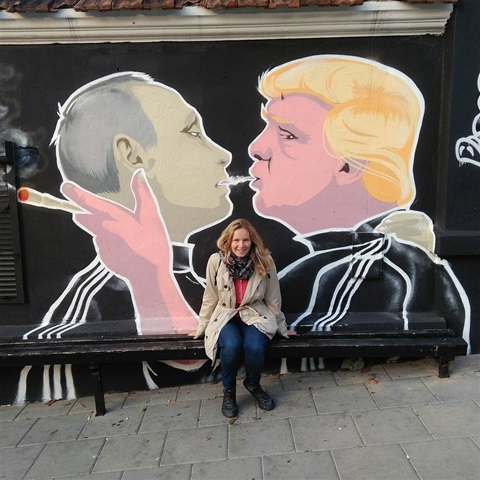Reportage from ERASMUS in Lithuania
Michaela Valentová
Featured image::

After sixteen hours spent on the bus, we (i.e. myself and Věrka) and an enormous amount of luggage got off at the bus station in Kaunas, Lithuania. At that moment we appeared in the country that my grandmother will always call Russia. Fortunately, our mentor picked us up soon and helped us get, with just minor hardships, to the dorms. Little did we know at that time that on the very first day we would experience nearly everything typically characterizing our one-term-long study stay in Lithuania – Czechoslovak retro trolleybuses, ubiquitous road repairs and rain. We have really experienced much more than enough of rain.
Since we arrived before the beginning of the academic year, we also experienced the Welcome Week – the result of an incredibly huge amount of energy invested by the university staff into welcoming international students. That week brought us a lot of experiences, but it also taught us one thing: it is incredibly easy to get along well with those people who are in a similar situation. It does not really matter where they come from or what they study, there is always a common topic to share and talk about. In those first weeks, smart technologies really helped us a lot. Not only would it have been difficult to know where and when you were to go if you had not had your smartphone, but it would also have been difficult to remember so many names immediately.
When the courses finally started, we spent the first two weeks of the term running after and contacting the coordinators to get our schedule, which really reminded me of our university in Hradec. The way of studying here, at KTU, is quite different from the way common in our country. The courses are much more interactive and you often have nothing to write down. Simultaneously however, you are assigned to do a lot of small homework, so it rather reminds us of our secondary school.
Probably the strongest experience for me was the moment when, after an unsuccessful attempt to eat a peach, I had to find a dentist in Kaunas. At the clinic recommended by my mentor, not only did they not speak English, but they did not want to speak to me even with “hands and feet”. When I arrived at another dentist´s after further vicissitudes, the doctor was nice, but she didn’t speak English either. She first scared me to death when she gradually attached all kinds of false teeth to my teeth. For a moment I was sure she was going to extract my teeth. I realized how quickly I generalized, because having experienced just the two unsuccessful attempts, I declared all Lithuanian dentists to be a bunch of idiots. I would have given anything for being at home at that moment, where nothing like this would have happened. It took me a while until I realized that something like this would most likely happen to every foreigner in the Czech Republic. In fact, Lithuanians are much better at English than Czechs are, and elderly people mostly speak Russian at least.
In the four months we have spent here, we have managed to travel a lot. Probably the most interesting place we have been to is the Curonian Spit – a piece of land in the Baltic Sea, stretching from Kaliningrad along the coast to Klaipeda in Lithuania. We definitely did not expect to see wide long beaches and even dunes in Lithuania. Nevertheless, that is Lithuania; it is a country of lakes and forests, which can definitely be beautiful, but it depends a lot on the weather. And Lithuanians are unlucky if their weather is considered. Autumns are mostly rainy, grey and depressing. It is interesting that although such weather is typical of Lithuania, Lithuanians are not happy about that and they have not coped with that. And maybe that is why Lithuania is the country with the statistically highest number of suicides per inhabitant.
Although we are staying in the second largest city in Lithuania, we consider Kaunas to be rather a real village. Even a short distance from the city centre, you can find badly maintained houses with large gardens, gravel roads full of holes etc. Once I was crossing a busy four-lane road not far from the city centre, and a few steps away, outside a peeled apartment building, I saw a man who was sharpening his scythe. Kaunas can be described as a town full of contrasts between the old and the modern, between rural and urban. And Kaunas is also a city full of incredibly large parks and remarkable graffiti.
I could probably talk for a longer time, for example about the Lithuanian obsession with shopping centres and big chains or about the deplorable density of Holocaust memorials in Lithuania. But that would be a long time until I would stop talking. Obviously, it is hardly manageable to squeeze experiences of a four-month stay in just one text.
Featured image::
